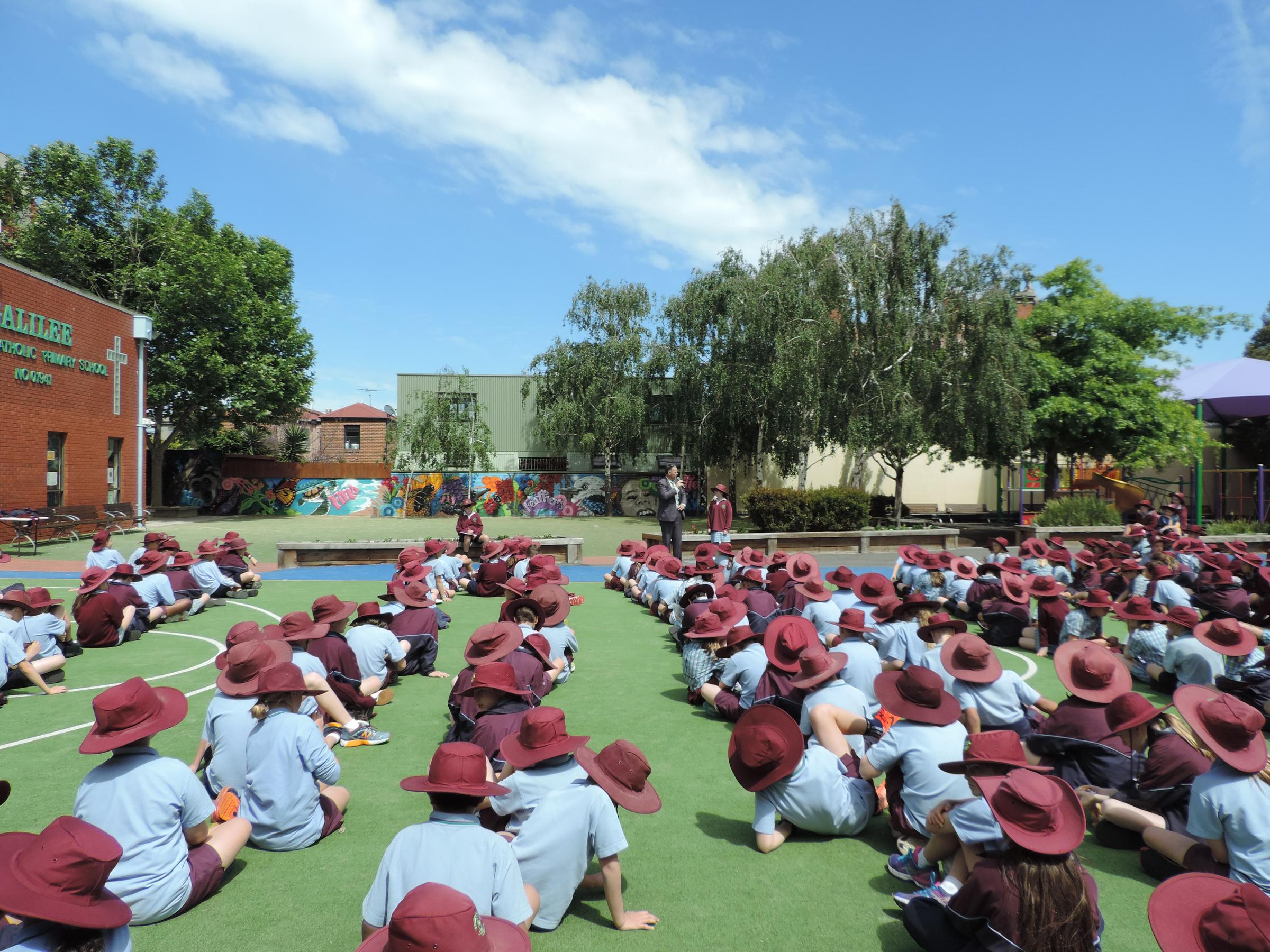Principal's Report

Thank you
As our mornings get colder and afternoons get more miserable, we want to thank our excellent crossing supervisors who brave all kinds of weather. Jimmy and Noel keep us all safe with a big smile on their faces.
Classroom Behaviour
"Student behaviour at school is a better predictor of educational and career success than IQ, socioeconomic background or personality," according to a US study. Schools that promote and enforce expectations of behaviour often achieve better academic results (referenced in article below). Students want to feel safe both physically and emotionally and when they do, they show greater signs of creativity, innovation and risk-taking. Behaviour management is not just about giving consequences but also creating clear guidelines and education around appropriate behaviour.
At Galilee, we promote positive behaviour through: valuing relationships; classroom and school rules; Circle Time; Respectful Relationships, Buddy Program and Friendship Groups; Child Safety Policies; Religious Education; an emphasis upon restoring relationships; Berry Street Model strategies used in each room; our Pastoral Care Policy which can be accessed on the school website.
Parents also play a critical role in the way students behave at school. They are a product of the values and role modelling shown to them by their parents. Parenting is a big responsibility and our children will often mimic our responses to issues such as: how we handle pressure, treating others with respect, tolerances of other races, resilience and persistence etc.
Our children will continue to make mistakes, even with positive role modelling, but it is important to teach them to reflect upon their behaviour, admit any mistakes and devise strategies for how to learn and help fix a problem. If we fail to do this, our children will struggle in the future to resolve minor and major conflicts. The ability to resolve conflicts can lead to a healthier self-esteem which can lead to greater academic success.
How I assist my child to solve their own conflicts?
Encourage independence and ASK them what they should do, before you TELL them. This shows that you have faith and trust in them. Of course, as a parent there might be more serious or recurring incidents that might require parental intervention.
At Galilee, we believe that everyone has the right to feel safe and to learn. While restoration of relationships is important, consequences may be required to help with learning.
Fortunately, society has grown and we recognise the need for consequences to be logical, when possible, rather than punitive. When I was at school, corporal punishments were still being used that resulted in the physical harm to anyone that broke any rules. This meant that fear was the main deterrent for inappropriate behaviour rather than respect for one another. Once the punishment was removed the behaviour may re-occur.
Greater respect for ourselves and each other will lead to improved relationships and ultimately the learning of students. When teachers, students and staff work cohesively together there is a greater chance of a creating safe and orderly environment for learning.
National Sorry Day
National Sorry Day is an Australia-wide observance held on May 26 each year. This day gives people the chance to come together and share the steps towards healing for the Stolen Generations, their families and communities. Stolen generations refer to Indigenous Australians who were forcibly removed from their families and communities.
Tomorrow morning outside at 8:50am, we will hold a short ceremony to recognise the day and parents are welcome to stay.
The first National Sorry Day was held on May 26, 1998, which was one year after the tabling of a report about the removal of Aboriginal and Torres Strait Islander children from their families. The report, known as Bringing Them Home, acknowledged that Indigenous children were forcibly separated from their families and communities since the early days of European occupation in Australia. This removal was official government policy in Australia until 1969.
Australia’s Prime Minister Kevin Rudd tabled a motion in parliament on February 13, 2008, apologizing to Australia’s Indigenous people, particularly the Stolen Generations and their families and communities, for the laws and policies that inflicted profound grief, suffering and loss. This event is seen by many as a step forward in reconciliation.
Earlier last year we added new Australian and Aboriginal flags to the front of our school.
The Aboriginal flag is horizontally divided into two equal halves of black (top) and red (bottom) with a yellow circle in the centre. The black symbolizes Australia’s Aboriginal people and the yellow circle represents the Sun. The red represents the Earth and people’s relationship with the land. It also represents ochre, which is used in Aboriginal ceremonies in Australia.
Source: https://www.timeanddate.com/holidays/australia/national-sorry-day
The Torres Strait Islander flag features three horizontal stripes, with green at the top and bottom of the flag and blue in between, divided by thin black lines. A white dharri or deri (a type of headdress) sits in the centre, with a five-point star underneath it. The color green represents the land. The dharri symbolizes all Torres Strait Islanders. The black represents the people and the blue represents the sea. The five-point star symbolizes the island groups. The star is white, which symbolizes peace in this case. Bernard Namok designed the flag.
ACU Placement
Congratulations to Lauren Bland for completing a successful teaching round in 3R with Helen Rochecouste. We wish her all the best for the future and thank Helen for the support and guidance given to Lauren throughout the eight week placement.
Brain Cancer Awareness
Congratulations to the students, staff and parents of Galilee who raised outstanding awareness and money ($690.80) for Brain Cancer research. The staff held and breakfast and everyone was invited to wear a beanie and contribute a gold coin.
Lion King Jr
Today I got a surprise visit from Year 1S who showed me part of their class costume for the Lion King Jr. All classes are currently rehearsing and it promises to be an exciting event.
Student Led Conferences
In the last week of the term, Mon 25th June, Student Led Conferences will be held from 2:00-5:00 pm. Students finish school at 1:30 pm on this day. Please ensure all students are booked into GOSH if you can not collect them by 1:30 pm.
The second day of conferences will be on Wed 27th June, 2:00-7:00pm. Students will finish at normal time, 3:25pm.
An email will be sent to families in the next few weeks regarding how to book appointment times.
It is compulsory for students to attend from Prep—Year Six. The meetings will go for a period of 15 minutes, comprising TEN minutes with student-led conferences followed by an allotted FIVE minutes for parental questions about the report. If students are unable to attend with the parent/ guardian, they will need to be re-scheduled to a suitable time for all. These scheduled meetings are not the only time made available to parents to discuss their child’s progress; these can be made at any time suitable to all parties.
In a student-led conference format, students and teachers prepare together and then the students lead the conference while teachers facilitate. The triad then sit together to review and discuss the work and the student’s progress. The message is that the students are responsible for their own success. Student-led conference models vary but the premise is the same: This is the student’s moment to share his or her reflections on achievements and challenges.
Some of the benefits of Student-Led Conferences:
- Students are given the opportunity to accept responsibility for their learning.
- Student-parent communication can be improved.
- Students become self-evaluative about their role in the learning process.
- Students become more conscious about what they are supposed to be learning in each learning area.
- Students self-identify their areas of strength and development.
- Students (with their teacher’s assistance) select work that accurately reflects their progress.
- Students work on improving their organisational and oral communication skills.
- Students, parents and teachers can engage in honest dialogue about student progress.
Why have Student-Led Conferences?
The purpose of a student-led conference is to make students more fully aware of their own learning and to help them take personal responsibility for their progress. In the traditional parent-teacher conference, students are ‘third parties’ to assessment, hearing about their progress through teachers and parents. Teachers and parents play a vital role in education but students must also take an active role in this area to maximise their potential for success. In preparing for a student-led conference students see how their strengths, weaknesses and behaviour can affect them as learners thus allowing them to take more responsibility for and control over their achievement in school. Student-led conferences are an experience that can improve the communication of both students and parents. In a student-led conference, students learn how to reflect on their learning, evaluate their progress and communicate this information to their parents. It is a fantastic opportunity for parents to listen to their children, to encourage growth and to help their child with specific problems. Hints for parents:
- Express positive interest and anticipation about the upcoming conference.
- Listen and respond to the student.
- Express pride in growth and progress.
- Ask questions (see below for samples).
- Be positive, offering to help in areas where improvement is needed.
- Recognise that students need to develop independence in communicating progress – the teacher will be there to facilitate and answer specific questions but will not take charge of the conference.
Possible questions to ask during a student-led conference: Can you explain this to me? How did you come up with this idea? How have you grown in this area? How can you improve in this area? How can we help you at home? What was important to you about this? If you could do this work over again, how would you change it? What future goals do you have as a student?
The appointments are a different format to Term One:
- Conferences go for 15 mins (not 10 mins);
- Students are to be in attendance;
- Students communicate their own learning and future goals for approximately 10 mins;
- Some students will use Dojo to show their learning;
- Five minutes allotted for parents/students to ask questions about the Semester One Report;
- School Reports will be sent home prior to the conferences.
Assembly Highlights
*Photos taken by our Year 6 school photographers
Cross Country Champs
A group of students represented Galilee at the Dendy Cross Country last Friday 18th May. They all ran their hardest with a number of students placing in the top 20. Congratulations to Oliver O. who placed 1st in the 9/10 Boys' Division, Dylan L. 1st in the 11 Year Old Boys' Division and Mark L. 1st in 12/13 Year Old Boys' Division. Great effort by all students and thank you to the staff and parents who helped on the day. Good luck to Oliver, Dylan, Mark and Jordan Z. (4th) when they compete in the Beachside Division next Tuesday 29th May.
PE change
Students in Prep E and 3W will need to wear their Sport Uniform on Monday 28th May.
Staffing
I will be away next week on a Catholic Education Principal Conference.
Shaun Tobin will be on Long Service Leave from June 4-August 24 returning Monday August 27 with Helen Walker replacing him.
Brittany Ford is away on Leave for the remainder of Term Two and will be replaced by Andrea Garafalo. Mrs Ford's Reports will still be sent home this term but the Student-Led Conferences for 5O will be in the first week of Term Three.
A School Closure Day will occur on Friday June 8 for Report Writing in the new format.
Simon Millar
Principal
